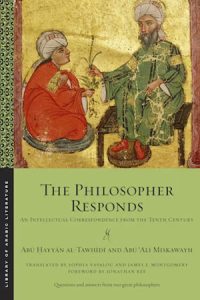The Philosopher Responds: An Intellectual Correspondence from the Tenth Century

Author(s): Abu Ḥayyān al-Tawḥīdi & Abu ‘Ali Miskawayh
Translator(s): Sophia Vasalou & James E. Montgomery
Publisher: New York University (NYU) Press
Year of Publication: 2021
Print Length: 446 pages
Genre: Islamic Studies / Theology, Ethics and Philosophy, Science; Non-Fiction / History, Religious Studies
Topic: Islam, Muslim, Ethics & Morality, Human Nature & Character, Islamic Psyche, Human Psyche, Science
Questions and answers from two great philosophers
Why is laughter contagious? Why do mountains exist? Why do we long for the past, even if it is scarred by suffering? Spanning a vast array of subjects that range from the philosophical to the theological, from the philological to the scientific, The Philosopher Responds is the record of a set of questions put by the litterateur Abū Ḥayyān al-Tawḥīdī to the philosopher and historian Abū ʿAlī Miskawayh. Both figures were foremost contributors to the remarkable flowering of cultural and intellectual life that took place in the Islamic world during the reign of the Buyid dynasty in the fourth/tenth century.
The correspondence between al-Tawḥīdī and Miskawayh holds a mirror to many of the debates of the time and reflects the spirit of rationalistic inquiry that animated their era. It also provides insight into the intellectual outlooks of two thinkers who were divided as much by their distinctive temperaments as by the very different trajectories of their professional careers. Alternately whimsical and tragic, trivial and profound, al-Tawḥīdī’s questions provoke an interaction as interesting in its spiritedness as in its content.
Table of Contents
Letters from the General Editor
Foreword
Acknowledgments
Introduction
Map: Buyid and Neighboring Lands
Note on the Text
Notes to the Introduction
The Philosopher Responds
1. On differences between a number of similar words / 2. On why people commend the keeping of secrets yet still disclose them / 3. On why certain names are more pleasing than others / 4. On why people preach renunciation but do not practice on it; on reasons, causes, time, and place / 5. On why people seek worldly goods through knowledge but do not seek knowledge through worldly goods /
6. On why people long for the past / 7. On why men of knowledge tend to be conceited / 8. On why people are sometimes ashamed and sometimes proud of wrongdoing; on the meaning of shame / 9. On why people claim to have knowledge they lack / 10. On why it pleases people when others ascribe good qualities to them /
11. On why it is bad to praise people in their presence and good to praise them in their absence / 12. On why people want to know what others say about them in their absence / 13. On why people disapprove of young people who act as if they were older / 14. On why mean people tend to be mild-tempered and generous people volatile / 15. On why people need to acquire knowledge but not ignorance /
16. On why people who provoke admiration also feel wonder at themselves; on the nature of wonder; on describing and knowing God / 17. On why it is unseemly to eulogize long-time friends and acquaintances / 18. On why blind people are often endowed with unusual powers / 19. On why people say that nothing good comes from partnership / 20. On why people use intermediaries despite the problems with partnership /
21. On why people speak gladly about the needs of those they concern themselves with yet keep quiet about their own needs / 22. On why some people become famous after they dies / 23. On why men of virtue and reason feel envious toward their equals even though they know envy is blameworthy / 24. On why we fear death but sometimes welcome it / 25. On why thin people tend to be noble and fat people ignoble /
26. On why short people tend to be crafty and tall people foolish / 27. On why some people overstate and others understate their age / 28. On why people end up loving particular months or days and why they form different conceptions of different days / 29. On the meaning and origin of injustice / 30. On the significance of a popular saying, and the meaning of certain words /
31. On why relatives and kinfolk are prone to outbreaks of extreme hostility / 32. On why people become angry when others impute evil to them / 33. On why a person who is being talked about suddenly appears out of nowhere; on the nature of coincidences / 34. On the meaning of certain ordinary and technical terms / 35. On the meaning of certain prepositional expressions concerning God /
36. On the nature of the sense of familiarity we feel toward particular places and people / 37. On why epilepsy is so hard to treat / 38. On why people are so enamored of ascetic individuals / 39. On why some people squander their money despite the harmful consequences this entails while others are miserly even though this gives them a bad name / 40. On why some people keep their affairs private while others broadcast them for all to hear /
41. On why self-praise is unseemly / 42. On why people disparage avarice even though they’re avaricious; on the origin of avarice and generosity / 43. On why people blame treachery and praise fidelity even though treachery predominates among them / 44. On the origin of the customs of different nations / 45. On why people don’t grow young again after they’ve grown old /
46. On the benefit people derive from likening some things to others / 47. On why some dreams are true and others false / 48. On the nature of dreams / 49. On why friendship arises between apparently dissimilar individuals / 50. On the definition and nature of knowledge /
51. On why people make apparently false statements when expressing admiration / 52. On why people take pleasure in contemplating beautiful forms / 53. On why people are more adept at counseling other than at managing their own affairs / 54. On why the sight of open wounds provokes horror and fascination / 55. On why people love the present world; on whether the religious Law can conflict with nature /
56. On why people take their own lives / 57. On a philosophical puzzle relating to the act of suicide / 58. On moral change and acting out of character / 59. On the meaning of a certain saying concerning God’s beneficence / 60. On why noble-minded people love cleanliness /
61. On the merits of singing versus playing musical instruments / 62. On why some people master different subjects more easily than others / 63. On the nature of physiognomy / 64. On why people covet things denied to them / 65. On why people inquire into what will happen in the future /
66. On the influence of companions on a person’s character and on the benefits of companionship / 67. On why people scorn certain forms of ostentatious demeanor and why individuals aren’t simply allowed to do as they please / 68. On what the soul seeks in this world and on the nature of human beings / 69. On the nature and attributes of God / 70. On why people experience fear in the absence of an apparent cause /
71. On why people fly into a rage when they can’t open a lock / 72. On why people with small heads have light brains / 73. On certain beliefs concerning the relation between a person’s facial hair and his character / 74. On why people racked by suffering find it easy to face death / 75. On why people denigrate things they fail to attain and are hostile to things of which they are ignorant
76. On why it is easier to make enemies than friends / 77. On why atheists act morally / 78. On why some people willingly become the butt of other people’s jokes / 79. On why people love to occupy positions of eminence / 80. On why we honor people for the achievements of their ancestors but not those of their progeny /
81. On why the progeny of illustrious people evince an elevated sense of entitlement and self-importance / 82. On whether it would be more consistent with the true order of things if all people were honored equally / 83. On different forms of divination / 84. On why some people dislike being addressed as “old man” while others relish it / 85. On why people take comfort from knowing they are not alone in their misfortune /
86. On the virtues of different nations, such as the Arabs, Byzantines, Persians, and Indians / 87. On why intelligent people are more susceptible to grief / 88. On why intrinsic merit and worldly fortune do not coincide / 89. On the meaning of coincidence / 90. On the nature of compulsion and choice /
91. On the reason for the wanderlust experienced by certain people / 92. On why people desire knowledge, and on the benefits of knowledge / 93. On why people and other animals respond so powerfully to certain kinds of sounds and musical effects / 94. On why older people are more liable to hope; on the meaning of “hope” and related terms / 95. On why women are more jealous than men; on the nature and moral status of jealousy /
96. On why more people die young than die old / 97. on why people seek likenesses / 98. On why we find it easier to represent extreme ugliness in our imagination than exquisite beauty / 99. On why sudden joy affects people so violently / 100. On why we experience states of suffering more intensely than states of well-being /
101. On why seeing someone laughing causes others to laugh / 102. On why human beings are so attached to the world despite the misfortunes and suffering they experience in it / 103. On why people say the world would fall to ruin if it weren’t for fools / 104. On the anxiety experienced by people who have something to hide / 105. On why we are more likely to heed a preacher who practices what he preaches /
106. On why people regret their failure to honor and benefit from great men during their lifetime / 107. On why Arabs and non-Arabs declare their pedigrees in times of war / 108. On why people distinguish between different kinds of air, water, and earth, but not different kinds of fire / 109. On why people feel happier when they unexpectedly obtain something they weren’t seeking than when they obtain what they were seeking / 110. On why fine edifices fall to ruin when left uninhabited /
111. On why men of sublime character beget knaves / 112. On why our longing for home grows more intense the nearer we come to it / 113. On the meaning of the dictum that judgement sleeps while passion keeps watch / 114. On a remark concerning logic made by the dialectical theologian Abu Hāshim to the philosopher Abū Bishr Mattā / 115. On why some Arabic words are feminine and others masculine /
116. On whether a human being could know everything / 117. On why new incumbents are harsh toward the officials they replace / 118. On why human beings are considered to be orphans after losing their father rather than their mother / 119. On why chess is so hard to master / 120. On why people dislike changing their name or patronymic, and why they have a sense of aversion toward certain names and titles /
121. On the mannerisms of people whose mind is preoccupied, and on why people have so many different ways of behaving when they feel anxious or unhappy / 122. On different ways of approaching God’s attributes / 123. On why we find it easier to remember what is correct than what is defective / 124. On why prosodists tend to produce flat poetry / 125. On the meaning of the dictum that the learned live longer than the ignorant /
126. On why it is harder to speak eloquently than to write eloquently / 127. On the significance of the fact that human beings are the only animals to stand upright / 128. On why certainty is less enduring than doubt / 129. On why we laugh harder when a person keeps a straight face / 130. On the meaning of the scholars’ proposition that a rare instance attracts no ruling /
131. On the possibility of certain kinds of coincidences obtaining / 132. On the role of analogical reasoning in the linguistic sciences / 133. On whether God created the world for a cause / 134. On why a life of comfort makes people feel oppressed and leads them to behave wantonly / 135. On why some things are best when they’re new and others are best when old /
136. On why people who display great piety are prone to arrogance / 137. On why a warm manner is more pleasing than a cold benefaction / 138. On why those closest to a king are less inclined to prattle about his person than those at the farthest remove from him / 139. On Ibn Sālim al-Baṣrī’s claim that God perceived the world while it was nonexistent / 140. On why the poets love to dwell on the apparitions that come to them in their sleep /
141. On why people are reluctant to advertise their merits / 142. On the relative merits of verse as against prose / 143. On why people feel oppressed when things are prohibited to them / 144. On why preachers are affected by stage fright when addressing large audiences / 145. On why we hate hearing the same thing twice /
146. On whether the religious Law can conflict with human reason / 147. On a remark made by Aḥmad ibn ‘Abd al-Wahhāb concerning the possibility of uttering something that is completely false versus something completely true / 148. On why excellent souls find repose in the truth and find falsehood repugnant / 149. On a question put by Aḥmad ibn ‘Abd al-Wahhāb concerning why animals are generated inside plants but plants are not generated inside animals / 150. On the nature of alchemy and why people are so enamoured of it /
151. On a question put by Aḥmad ibn ‘Abd al-Wahhāb concerning the difference between the words “indeterminable” and “impenetrable” / 152. On the disagreements between jurists / 153. On why people despise kings who are governed by pleasure and fear kings governed by reason / 154. On the physical reactions people exhibit when listening to music / 155. On why liars often tell the truth but not the reverse, and on whether habits can change /
156. On certain popular sayings / 157. On the distinction between different forms of divination / 158. On why there are four categories for inquiry: whether, what, which, and why / 159. On the nonexistent / 160. On why a physician rejoices at the recovery at his patient /
161. On why money is made of silver and gold and not other substances / 162. On the specific time when the soul attaches itself to the body / 163. On whether souls can recollect what they used to know after leaving the body / 164. On why mountains exist / 165. On why there are three souls /
166. On why the sea is located on a particular side of the earth / 167. On why seawater is salty / 168. On how we can see things in our sleep without an organ of sense perception / 169. On a puzzle concerning the possibility of seeking something we do not know / 170. On why it does not snow in the summer /
171. On the proof for the existence of angels / 172. On what justifies the suffering of children and non-rational animals / 173. On why it takes us longer to hear thunder than to see lightning / 174. On the possibility that a person may abandon every belief he adopts and infinitum
Notes
Glossary
Bibliography
Further Reading
Index
About the NYU Abu Dhabi Institute
About the Translators
The Library of Arabic Literature

Abu Ḥayyān al-Tawḥīdi was a prominent litterateur and philosopher in Baghdad during the Buyid period. The poverty and lack of recognition from which he suffered for twenty years embittered him to such an extent that toward the end of his life he burnt his own books as a gesture of despair and defiance.
Source: https://www.iranicaonline.org/articles/abu-hayyan-tawhidi-ali-b
More from Abu Ḥayyān al-Tawḥīdi in this library, click here.

Abu ‘Ali Miskawayh was a philosopher and historian born in Rayy during the Buyid period. He was a boon companion, litterateur and accomplished writer in Arabic on a variety of topics, including history, theology, philosophy and medicine. As a Neoplatonist, his influence on Islamic philosophy is primarily in the area of ethics, particularly practical ethics, conduct, and the refinement of character.
Source: https://www.iranicaonline.org/articles/meskavayh-abu-ali-ahmad
More from Abu ‘Ali Miskawayh in this library, click here.

Sophia Vasalou is Senior Lecturer and Birmingham Fellow in Philosophical Theology at the University of Birmingham. Her books include Moral Agents and their Deserts: The Character of Mu’tazilite Ethics, Wonder: A Grammar, and Ibn Taymiyya’s Theological Ethics. Her main interests lie in ethics, particularly forms of Islamic ethics with a strong rationalist edge.
Source: https://www.libraryofarabicliterature.org/books/9781479806355/the-philosopher-responds/
More from Sophia Vasalou in this library, click here.

James E. Montgomery is Sir Thomas Adams’s Professor of Arabic. He studied Arabic and Ancient Greek at Glasgow University (1980-1984), spent two years on an unfinished DPhil at Oxford (1984-1986), where he was a Snell Exhibitioner at Balliol College before taking up a lectureship at Glasgow (1986-1992), where he decided to do a different PhD which he submitted just before the birth of his daughter Natasha in 1990. Senior Lectureships at Oslo and Leeds preceded his move to Cambridge in 1997.
Source: https://www.ames.cam.ac.uk/people/professor-james-montgomery
More from James E. Montgomery in this library, click here.
